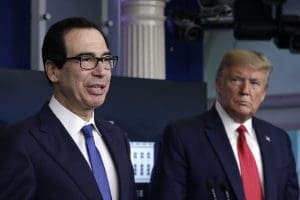Treasury secretary praises Trump for shutting down the economy when he didn't
Steve Mnuchin also said that safety rules shouldn’t be reinstated, even if COVID-19 cases spike.

Treasury Secretary Steve Mnuchin praised Donald Trump on Thursday for his decision to shut down the economy to curb the COVID-19 pandemic. But Trump never did so.
In a CNBC interview, Mnuchin argued that Trump was right to institute social distancing rules as the coronavirus spread across the country, but he said that such an approach would never be used again.
“The good news is, you have a lot of capacity of testing and hospitals,” he claimed. “That was something that was the big problem and the reason why the president needed to close down parts of the economy.”
“I think it was very prudent, what the president did,” he added. “But I think we learned a lot.”
But Trump in fact refused to issue stay-at-home orders to close down parts of the economy, leaving it to state governors to decide whether and how to act on their own.
“We’ve talked about it … obviously there are some parts of the country that are in far deeper trouble than others,” he said in late March. “If we do that, we will let you know, but it’s pretty unlikely, I think, at this time.”
“You have to give a little bit of flexibility,” he said on April 1. “I mean, if a state in the Midwest, or if Alaska, as an example, doesn’t have a problem, it’s awfully tough to say, ‘Close it down.’ So we have to have a little bit of flexibility.”
On April 10, when asked specifically about Gov. Ron DeSantis’ refusal to close Florida, Trump said, “I like to allow governors to make decisions without overruling them, because from a constitutional standpoint, that’s the way it should be done.”
As states ease social distancing rules, many have seen a spike in new COVID-19 cases and hospitalizations. CNN reported on Thursday that 19 states are currently seeing an upward trend in new coronavirus cases.
Public health experts and economists warned that a premature reopening would cause more deaths and economic damage.
“If some areas, cities, states or what-have-you, jump over those various checkpoints and prematurely open up without having the capability of being able to respond effectively and efficiently, my concern is that we will start to see little spikes that might turn into outbreaks,” Dr. Anthony Fauci, director of the National Institutes of Allergy and Infectious Diseases, told Congress last month.
Still, Mnuchin said Thursday, “We can’t shut down the economy again. I think we’ve learned that if you shut down the economy, you’re going to create more damage, and not just economic damage but there are other areas, and we’ve talked about this, medical problems and everything else that get put on hold.”
Trump has for the most past stopped focusing on the pandemic since ending his daily briefings in May. Instead, he has spent his time attacking peaceful protesters, defending Confederate memorials, and bragging about his golf courses.
Published with permission of The American Independent Foundation.
Recommended

Ohio doctors fear effects of emergency abortion care case set to go before U.S. Supreme Court
A federal law that allows emergency departments to treat patients without regard to their ability to pay will be under U.S. Supreme Court scrutiny this week, and Ohio doctors are concerned about the case’s local impact on emergency abortion care.
By Susan Tebben, Ohio Capital Journal - April 23, 2024
House GOP votes to end flu, whooping cough vaccine rules for foster and adoptive families
A bill to eliminate flu and whooping cough vaccine requirements for adoptive and foster families caring for babies and medically fragile kids is heading to the governor’s desk.
By Anita Wadhwani, Tennessee Lookout - March 26, 2024
U.S. House Speaker Johnson says IVF should be protected — just not by Congress
U.S. House Speaker Mike Johnson said Thursday that it’s up to states and not Congress to preserve access to in vitro fertilization, weighing in on a growing national debate and campaign issue.
By Jennifer Shutt, States Newsroom - March 14, 2024








































































